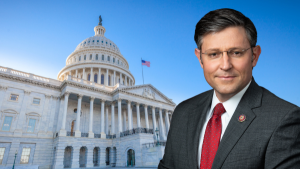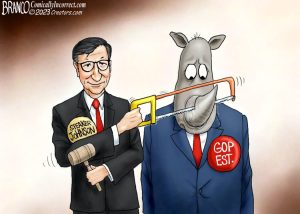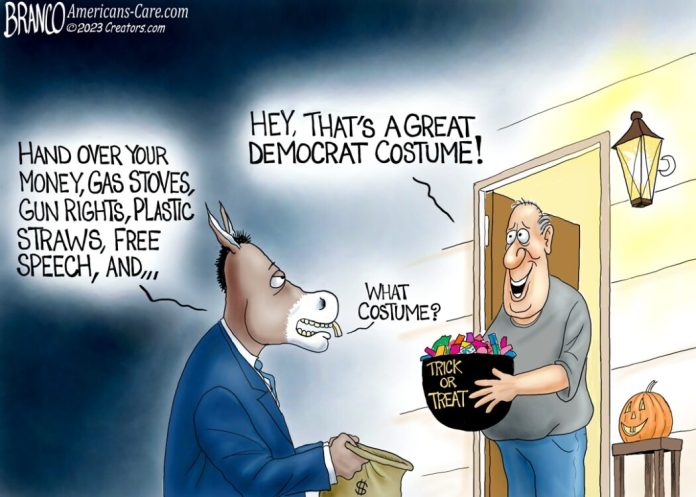Life, Liberty, Property #37: Speaker vote suggests Republicans are finally ready to act like Democrats, uniting around Rep. Mike Johnson.
IN THIS ISSUE:
- Speaker Vote Suggests Republicans Are Finally Ready to Act Like Democrats
- Ambiguity in Maine Lockdown Reports
- Cartoon
SUBSCRIBE to Life, Liberty & Property (it’s free). Read previous issues.
 Speaker Vote Suggests Republicans Are Finally Ready to Act Like Democrats
Speaker Vote Suggests Republicans Are Finally Ready to Act Like Democrats
The House Republicans’ unanimous support for Rep. Mike Johnson (R-LA) in the Speaker vote may indicate GOP lawmakers are finally ready to act like Democrats.
For taxpayers, that would be the best news in many, many years. Bringing Democrats’ level of enthusiasm, determination, tenacity, and unparalleled political acumen to a fight for a smaller national government and a respect for individual rights might just save the nation—if anything can.
Johnson is a solid conservative and a constitutional scholar with lifetime ratings of 92 percent from the American Conservative Union and 90 percent from Heritage Action. In 2020, Johnson argued states’ unconstitutional changes in voting procedures in a supposed response to COVID-19 invalidated their elector slates. He has consistently opposed federal government support of abortion and sex and gender radicalism.
Johnson voted against the bipartisan short-term spending bill passed with near-unanimous Democrat support on September 30 (just one Dem voted no) in an allegedly Republican-controlled chamber. He voted against sending $40 billion to Ukraine for warfighting last year and another $300 million this year. Johnson has expressed agreement with the GOP budget hardliners’ call for individual appropriations bills, while proposing another short-term spending measure to fill in the gap until those bills can be passed.
I know he is not perfect, but Johnson’s proposed approach would set up a stark conflict with the Democrat-majority Senate and spending-fanatic President Joe Biden. As that indicates, Johnson does not subscribe to the bipartisanship myth that has served as the basis for big-government uniparty rule for decades.
“In Biden’s first two years, Johnson voted against a slew of bipartisan bills—including to establish a Jan. 6 independent commission, the infrastructure law, reauthorization of the Violence Against Women Act, a modest new gun law and the CHIPS and Science Act,” NBC News reports. In addition, “He voted against bipartisan legislation to codify same-sex marriage, which Biden signed into law in 2022,” and “has a spotless history of voting against legal abortion,” NBC News observes.
“Johnson isn’t known for bipartisanship,” The Wall Street Journal reports. “He was ranked 429th out of 435 lawmakers in the 2021 bipartisan index kept by the Lugar Center and the McCourt School of Public Policy at Georgetown University, situated among members of the staunchly conservative House Freedom Caucus.”
Johnson’s votes against war money for Ukraine exemplify an approach to government that attends to the interests of the American people, in direct opposition to the uniparty’s support for no-borders transnationalism and brutal foreign wars that dismally fail to achieve their ostensible purposes.
Having served in the House for seven years, Johnson has much less seniority than the four previous chairs: two had 16 years of experience, and two had been there for 20 years. D.C. insiders will characterize this as a deficiency, as Sen. Mitt Romney (R-UT) has already done. NBC News reports:
Sen. Mitt Romney, R-Utah, said that he knew “very little about him” but that it would “be interesting to see how the House runs if they choose a speaker that has no experience in leadership or as a committee chair. … Inexperience seems to be a qualification.”
I consider Johnson’s shorter tenure a plus. Nine to 13 fewer years of compromising with—and conspiring with—Democrats to defraud and disempower the American people is a good deal less rottenness than we usually get with newly minted House Speakers.
The fact the media continually expressed horror and agony over the lack of activity in the House of Representatives during the 22 days the speaker search occupied tells you all you need to know about the reality of uniparty rule and what was really at stake here. The press wanted Republicans to do the usual: accept a leader who would “get things done,” “be practical,” “settle for what they can get,” and above all, “always pursue bipartisanship.”
Bipartisanship is the central pillar of ever-expanding government. The uniparty scam starts with Democrats demanding ambitious schemes of government spending and regulation, which the chattering classes characterize as laudable idealism and wise “investments.” Republicans resist based on the cost to taxpayers, which the media bigmouths invariably castigate as small-minded and miserly.
If the Democrats have a legislative majority and the presidency, they then just do what they want. The extravagant Affordable Care Act and Inflation Reduction Act were passed with all Republicans voting no (and with all Democrats voting yes in the latter case), and then signed by Democrat presidents. The American Rescue Plan Act of 2021 fiscal stimulus boondoggle passed with unanimous support from Senate Democrats and only one House Democrat voting against it.
Republicans can stick together at times, as in case of the Tax Cuts and Jobs Act, but they usually do so only when they cannot win, as happened with the American Rescue Plan Act. Democrats consult with Republicans only when they need votes from GOP turncoats, as when Sen. John McCain singlehandedly rescued Obamacare from partial repeal.
This year’s budget bills show how the game can change. A small group of Republican House members has prevented GOP leaders from colluding with the Democrats to put off a reckoning about the appalling $2 trillion federal budget deficit until after next year’s elections, which would obviously help protect big spenders from voter scrutiny. The budget hardliners would force the Democrats to accept sole responsibility for that catastrophic, unprecedented budget hole.
Johnson’s plan for budget negotiations fits with the hardliners’ position and would draw a big fat line between the two parties’ positions on government spending. If that approach risks producing Democrat majorities in both houses of Congress in next years’ elections, the nation would have been lost anyway via Republican capitulation to fiscal suicide. In any case, I do not believe that the public knowingly supports such idiocy. Republicans’ complicity in uniparty rule has hidden the truth.
The search for a speaker who could unite the House Republicans seems to have come down to the question of trust. Budget hardliners were not the only GOP representatives who complained that former speaker Kevin McCarthy broke promises. The budget negotiations prior to the speaker gap were fraught by more fighting among Republicans than between the GOP and the Democrats. Now the hardliners indicate they are willing to consider a stopgap bill to fund the government while they work their way through individual appropriations bills to restore regular order to the process—a course they could not trust McCarthy to lead. The Wall Street Journal reports:
Many lawmakers believe Johnson will have a little more leeway next month with conservatives who celebrated his ascension to power this week.
Rep. Chip Roy (R., Texas) said he would be open to a short-term spending patch in service of a longer-term goal of reducing federal spending. “It just depends on how it’s structured, framed and whether it’s tactical,” he told reporters.
Proof that the return to regular order is a good idea can be found in Democrats’ opposition to it, as the Journal reports:
Democrats said that so far, the individual spending bills passed with GOP support in the House aren’t getting them closer to a viable bipartisan compromise.
“There’s a view that we can do these individual bills the way we were doing before this chaos—I think that’s futile,” said Rep. Rosa DeLauro of Connecticut, the top Democrat on the House Appropriations Committee. DeLauro said there wasn’t enough time to deliberate on each individual bill. “That ship sailed, my friend.”
Let it sail. Compromise is the right choice if your goal is to get legislation through the Senate and signed by the president. It does not make any sense at all, however, if your goal is to achieve something that you want. Compromise does not get you what you want. It gets you what the other side is willing to give you under the existing circumstances.
Democrats know the only way to get what you want is to use your leverage to force your opponents to accept your terms. In Congress, leverage is found in the very thing the Republicans have consistently avoided: legislative inaction.
Under the Constitution, the House of Representatives, like all branches and levels of government in the United States, has veto power. If the House does not approve of a proposed federal action, it need not and should not appropriate money and statutory approval for it. Let those who continually want more government action be the ones to compromise.
Inaction is your superpower.
The group that wants action is always in the weaker position. The urgency for agreements with Democrats ensures Republicans will not get what they want. Democrats use that against them. They stick together to insist the GOP give them what they want or suffer the blame for stopping the runaway federal goodies train. The Democrats understand the Republican mind and its fundamental weakness: the desire to be seen as the responsible party, the sensible people in the room.
That is a foolish desire. People clamoring for freebies are not going to support sensible people. Sensible people must forget about those who would bankrupt the nation and send us into ruin, and they must forget about trying to please the corrupt media that serve them.
The split among congressional Republicans reflects a great divide among the American people over whether to support the ever-expanding mega-alliance of big government, big money, big business, and big media, aligned with the nation’s so-called cultural and educational institutions, which are just a big brainwashing outfit doing the plutocrats’ bidding.
To me, those 22 days without action from Congress during the speaker deliberations were the best governing we’ve had for quite a while. If Johnson and the budget hardliners can transform their party from a surrender caucus into a group that fights like Democrats, this nation might just have a chance of surviving beyond 2024.
Sources: NBC News; The Wall Street Journal; Committee for a Responsible Federal Budget; The Wall Street Journal
 Ambiguity in Maine Lockdown Reports
Ambiguity in Maine Lockdown Reports
The atrocious mass shooting in Lewiston, Maine on Wednesday night has predictably brought renewed attention to firearms policy and more calls for laws against ownership and possession of firearms. The Second Amendment precludes such actions, at least until the U.S. Supreme Court (or, as is far less likely, Congress or the president) overrules its longstanding Fourteenth Amendment Incorporation Doctrine.
In light of that reality, it was inevitable governments would turn to their new favorite method of overriding constitutional rights: lockdowns. CBS News reports:
A shelter in place order was expanded Thursday to include more than a dozen communities in Maine after a mass shooting in Lewiston Wednesday night. A suspect, identified as Robert Card, remains on the loose.
Two entire counties are now under a shelter in place advisory, as the manhunt for Card continues. All residents of Androscoggin County, which includes Lewiston, and Northern Sagadahoc County are urged to remain in their homes, and make sure to lock their doors and cars. Police say Card should be considered armed and dangerous.
The use of two terms, with completely different meanings, to describe the same thing is puzzling. Is it an order, or is it an advisory? Schools were closed, and the authorities made it clear they wanted people to stay at home and off the streets. That is perfectly reasonable. Businesses closed voluntarily. That made sense for them and their customers. Those are free choices.
The media, however, repeatedly described the government statements as orders in addition to using terms such as “advisories.”
A Maine TV station described the government actions as “shelter in place orders” and a “lockdown order,” reporting, “Residents in Lewiston, Lisbon and Bowdoin are being told to stay inside their homes and lock their doors.”
“Being told to stay inside” implies that this was an order, with implied force of law behind it.
The so-called orders, however, sound more like a request in the TV station’s quote from the state police:
In a message from their Facebook page, Maine State Police state: “Please stay off the streets and allow law enforcement to diffuse the situation. If you see any suspicious activity or individuals please call 911.”
The use of the word “please” suggests the statement was a request, not an order. Local authorities, however, may have chosen to be more restrictive than the state police.
Boston’s Channel 10 reported numerous closings:
News Center Maine’s list of closings includes nearly 200 school districts, colleges, town offices, YMCAs, churches, banks, libraries and daycare centers. …
Many businesses remain closed across the state with the shooter still at large. Photos show a Starbucks in Portland, and a 7-Eleven and a convenience store in Lewiston among the closed businesses. L.L. Bean even closed its flagship store in Freeport on Thursday, though they haven’t said if it will reopen on Friday. Residents described situations where you can’t even go to the bank or a local restaurant in some areas.
A photo in the Channel 10 story shows a storefront that bears a paper sign stating, “CITY IS ON LOCKDOWN STORE IS CLOSED UNTIL FURTHER NOTICE.” That, too, indicates the lockdown is voluntary, though it shows the business owners want to convey the idea it is a government order and they have no choice in the matter.
It makes perfect sense, of course, for people to avoid confrontations with armed lunatics, and for businesses, government offices, and other institutions to close in order not to encourage people to put themselves in jeopardy. It is all too easy to imagine the potential for fatal mistakes if crowds of people are milling about while law enforcement officers are trying to capture a person who has already killed more people than were murdered in the state in the entire previous year.
Of course, simple self-preservation prevents people from doing that. Sensible people measure the risks and choose to be on the safe side.
In addition, there is no guarantee one is safe in one’s own home when a killer is on the loose, as a person who lives near Lewiston told CNN. The Blaze reports:
“That actually made me feel better, seeing the cops coming around here—that makes me feel a million times better,” he said. “And the situation like this, I wish I had a firearm.”
That is the essence of freedom: the right to make one’s choices and live with the consequences. Lockdowns are an insult to human dignity, full stop.
The media reports’ ambiguity regarding whether the lockdowns are voluntary or government-ordered is a disservice to the public. It’s important that the people know when their rights are being respected and when they are not.
Sources: CBS News; WMTW-TV-8; WBC News Boston; CNN
Cartoon

For more Budget & Tax News.
For more Rights, Justice, and Culture News.











